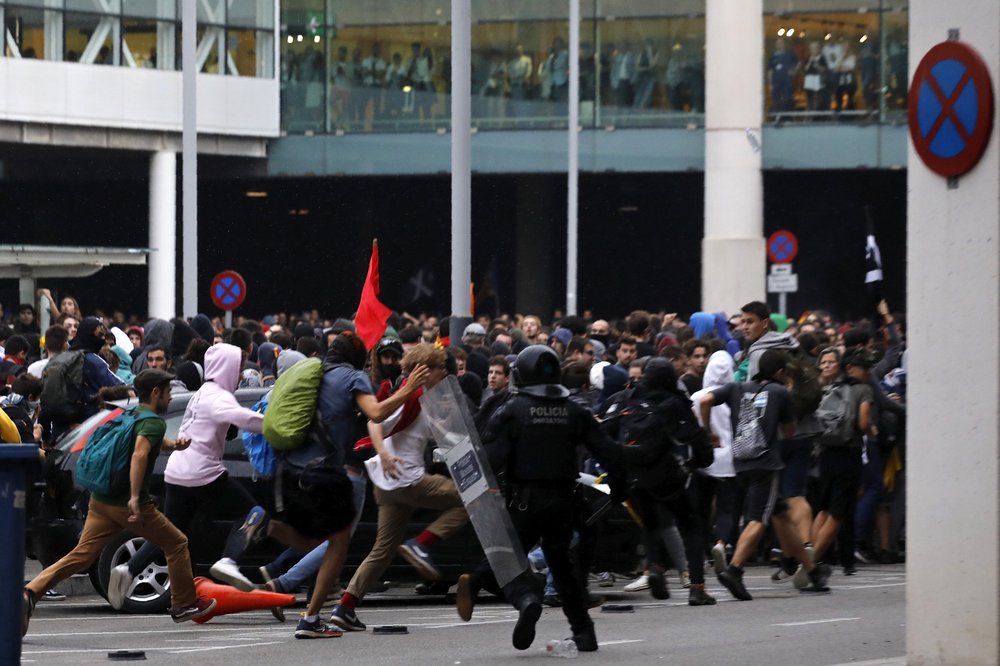
Riot policemen clash with protestors outside El Prat airport in Barcelona, Spain, Monday, Oct. 14, 2019. (Photo: AP)
Riot police charged at protesters outside Barcelona’s airport Monday after the Supreme Court sentenced 12 prominent Catalan separatists to lengthy prison terms for their roles in a 2017 push for the wealthy Spanish region’s independence.
Police used batons against the protesters who converged on El Prat airport after a call by the grassroots group Democratic Tsunami, which supports Catalan secession. An Associated Press reporter at the scene saw police fire projectiles. Spanish media said police had used foam-type bullets.
A dozen people were treated for minor injuries at the scene, Catalan emergency service SEM said.
Spain’s airport operator, AENA, said at least 67 flights were canceled.
The heavy prison sentences rallied the separatist cause, which is going through its most difficult period in years as its most charismatic leaders are behind bars or abroad, before Spain’s Nov. 10 general election.
The Catalan separatist movement’s two main political parties have been at odds over strategy, and the grassroots organizations that have driven the movement have voiced criticism about the lack of political progress.
Spain’s caretaker prime minister, Pedro Sánchez, said he hoped the sentence would mark a watershed in the long standoff between national authorities in Madrid and separatists in the Catalan capital Barcelona. Sánchez said the court’s verdict proved the 2017 secession attempt had become “a shipwreck.”
He urged people to “set aside extremist positions” and “embark on a new phase” for Catalonia.
But secessionists were defiant and took to the streets in a show of force.
Protesters also halted some Catalan train services by placing burning tires and wood on tracks. They also blocked some roads in the region. Further marches and protests were scheduled for Monday evening.
The convicted Catalan leaders — jailed for nearly two years while their case was heard — have grown into powerful symbols for the separatists. Many sympathizers wear yellow ribbons pinned to their clothes as a sign of protest.
Separatist politicians said they would give no ground.
Catalan regional president Quim Torra described the court’s verdict as “an act of vengeance.” He said it “will not stop us from acting on our determination to build an independent state.”
Ex-Catalan leader Carles Puigdemont, who with several others fled to Belgium in October 2017 when they were summoned to appear in court, said the general election is an opportunity to show “a massive response of rejection, as well as dignity and firmness” of Catalan separatism.
His comments came hours after a Spanish Supreme Court judge issued an international warrant for his arrest.
Andrew Dowling, an expert on contemporary Spanish politics at Cardiff University in Wales, said the sentences are “very harsh” and are “going to make a bad situation worse.”
“It’s going to create a terrible wound in Catalan society until these people are released,” he said by telephone. “I think it’s going to be the single most important issue for Catalans for the foreseeable future.”
Catalan identity is a passionate issue in the northeastern region bordering France, but elsewhere it has failed to capture the public imagination and, crucially, lacked international support.
At the center of the prosecutors’ case was the Oct. 1, 2017 independence referendum that the Catalan government held even though the country’s highest court had disallowed it.
The “Yes” vote won, but because it was an illegal ballot most voters didn’t turn out and the vote count was considered of dubious value. The Catalan Parliament, however, unilaterally declared independence three weeks later, triggering Spain’s worst political crisis in decades.
The Spanish government stepped in and fired the Catalan regional government, with prosecutors later bringing charges.
Nine of the Catalans on trial for their efforts to achieve independence received between nine and 13 years in prison for sedition. Four of them were additionally convicted for misuse of public funds, and three more were fined for disobedience. The Spanish Constitution says the country can’t be divided.
All of them were barred from holding public office.
“Today, they have violated all their rights. It is horrible that Europe doesn’t act,” 60-year-old civil servant Beni Saball said at a Barcelona street protest, referring to those convicted.
But retired 73-year-old bank clerk Jordi Casares said he wasn’t surprised by the verdict.
“It is fair because they went outside the law,” he said, walking out of his home on a Barcelona street. “I hope that after a few days of tumult by the separatists the situation can improve.”
Spain’s caretaker foreign minister Josep Borrell, soon due to become the European Union’s top diplomat, urged an effort at political and social healing because the independence effort is doomed.
“There is no single constitution of Europe that provides the possibility of creating unilaterally the independence of a part of the territory,” he told The Associated Press.
In their ruling, the seven Supreme Court judges wrote that what the Catalan leaders presented as a legitimate exercise of the right to decide was in fact “bait” to mobilize citizens and place pressure on the Spanish government to grant a referendum on independence.
The trial featured more than 500 witnesses, including former Prime Minister Mariano Rajoy, and 50 nationally televised hearings.
Defense lawyers argued that the leaders of the secessionist movement were carrying out the will of roughly half of the 7.5 million residents of Catalonia who, opinion polls indicate, would like the region to be a separate country.


